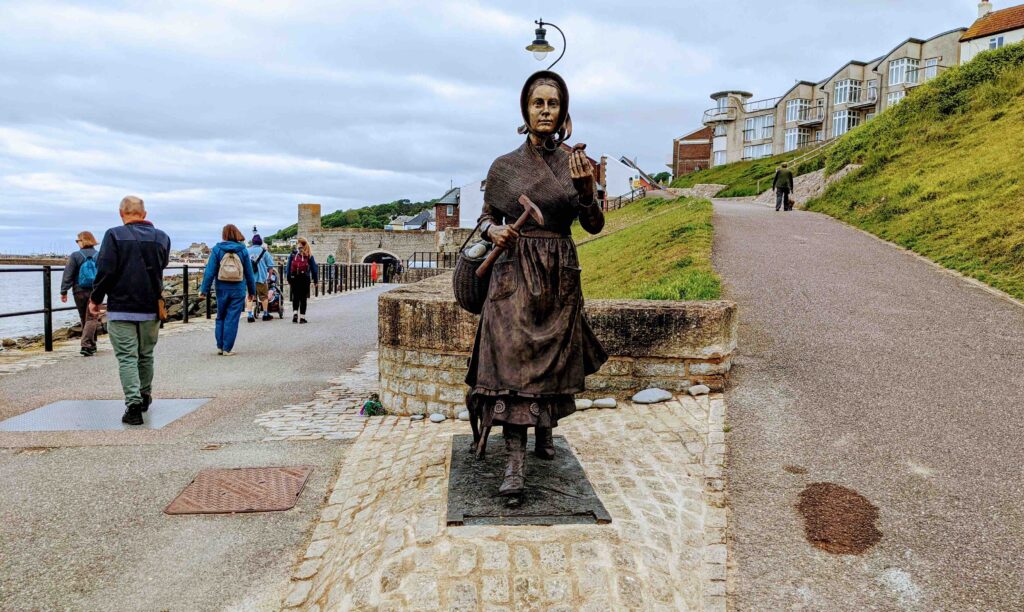A Timeless Village on England’s Coast Comes of Age
Judging from the traffic on the rural A-roads southwest of London during the first bank holiday of the summer, many Britons are rediscovering the glory of rural England.

It’s taken 145 million years, but Lyme Regis has finally come onto its own.
The masses appear to have discovered what once was a sleepy seaside village in Dorset, on England’s southwest coast, one that had been frequented primarily by holidaymakers in caravans and hardcore paleontologists. Covid and its aftermath may provide the explanation.
Many Britons seem to be staying home this summer. Sterling is at multi-year lows against the euro and the dollar, and the airports have been chaotic. Then there’s the humility of having to use the non-EU immigration lines when landing on the continent. Britons used to be waved through; no more.
It’s not that they aren’t itching to go somewhere. This is the first true post-Covid summer (2021 was a bust because of Omicron) and the pent-up demand to Do Something is palpable. So, judging from the traffic on the rural A-roads southwest of London during the first bank holiday of the summer — which happened to coincide with the Queen’s Jubilee — many are rediscovering rural England.
Places like Lyme Regis, three hours southwest of London by car, are reaping the rewards. The weather’s been divine — plenty of sun, light winds, and temps in the 70s — and the garden shed-sized beach huts on the Parade have fresh coats of pastel-colored paint. The pubs are packed, and the lines for fish and chips at the chippies down by the beach are insane.
The last time Lyme saw this much activity was probably in the early 1800s, when Jane Austen and her Georgian ilk would avail themselves of the healing power of seawater by riding out into the waves in bathing machines, essentially wooden sheds on wheels pulled by horses, and splash around in flannel gowns shielded from the prying eyes of any men on the shore.
Contemporaries of Austen included geologists William Buckland and Henry de la Beche. A frequent visitor to Lyme, Buckland was Oxford University’s first professor of geology and one of the first to try to square the biblical story of creation with what was then a growing body of fossil evidence that contradicted it. He also discovered coprolites, or fossilized feces, and was famous for his personal ambition to eat an example of every living creature on earth. To read some horrifying accounts of what went into his mouth, it seems he almost succeeded.
“The stomach rules the world,” he once lectured his students. “The great ones eat the less, the less the lesser still.”
De la Beche, the first director of the Geological Survey of Great Britain, lived in Lyme and was another leading geologist of the era. While there, he befriended an impoverished, dog-loving spinster by the name of Mary Anning, the village’s most famous daughter.

It’s hard to overstate Anning’s impact on the scientific world of the day. The daughter of a cabinetmaker, she discovered the world’s first correctly identified ichthyosaur when she was 12 years old and the first plesiosaur not long after. The discoveries, for which she received little credit at the time because of her sex, upended religious dogma about the age of the earth and introduced the concept of species extinction. Scouring the cliffs just west of Lyme Regis for fossils, her discoveries laid the groundwork for modern paleontology.
Those cliffs and the treasures they still yield are what bring most visitors to Lyme Regis and earned the area its Jurassic Coast moniker. On any given day, there will be dozens of people traipsing around the bases of the cliffs pecking at rocks with their hammers, hoping to dislodge fossilized ammonites, belemnites, and other ancient creatures that came to rest on the seabed 150 million years ago.
Nearly 20 years ago, there was but one fossil shop in Lyme Regis. Now there are three, and at least one intrepid local gentleman sets up a table at the entrance to the village and advertises a “fossil yard sale” every weekend during the summer.
A lot else has changed in Lyme Regis in 18 years. The two 18th century pubs at the base of Church street, where stagecoaches used to stop back in Anning’s day — the Pilot Boat and the Rock Point Inn — are almost identical from the outside, but unrecognizable inside. They used to be quintessential country pubs, cramped but cozy, with curmudgeonly publicans for whom a glass of chardonnay was an exotic request.
Now, the Rock Point Inn is a chain pub with barkeeps sporting goatees who shake cocktails like James Bond film characters. The Pilot Boat, with its long metal bar and dazzling skylights, could be in California. The food at both is, however, markedly better than it used to be.
The fish and chips have also improved, though the main shop, the Cobb Gate Fish Bar, has closed. Gone are the greasy cod filets wrapped in newspaper. A serving from Herbie’s down by the Cobb, the stone pier that snakes out into the harbor and dates to 1328, now includes a slice of lemon with a battered filet of lemon sole served on a bed of french fries in a cardboard boat. Grilled scallops are also on the menu, and senior discounts are available.
The other changes are cosmetic, and reflect the encroachment of modernity on a timeless setting. Coffee shops are everywhere, and high street chains have replaced many of the charity shops. Paul’s barber shop is now Paul’s men and boys hairdresser, and Fordhams is no longer an ironmonger; it is a kitchenware and homewares store. Eulogies for Old England will undoubtedly mark the demise of the various mongers as the beginning of the end.

